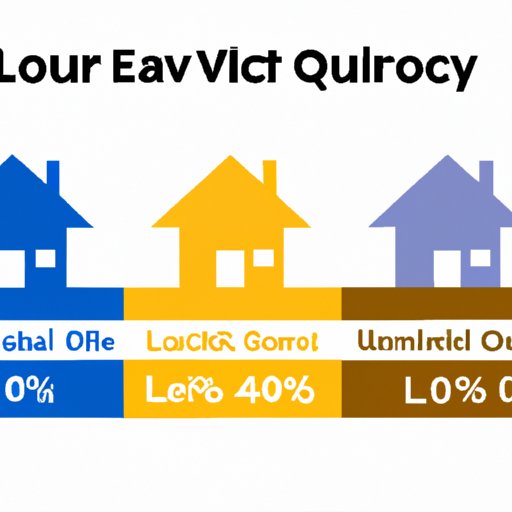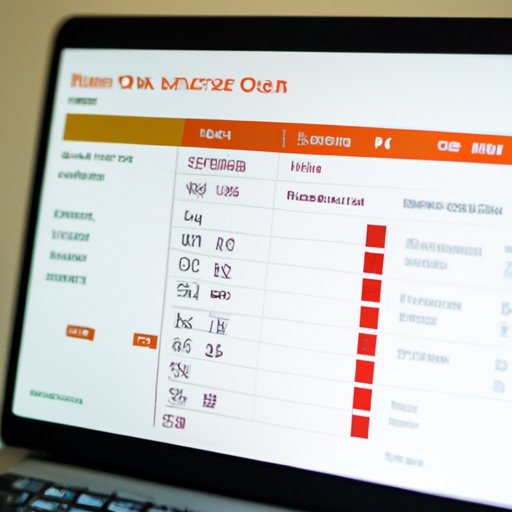
Introduction
Home equity refers to the value that is built up in a home over time. It is calculated by subtracting the amount owed on a mortgage from the home’s current market value. Home equity is important because it can be used in a variety of ways, such as for home improvements, debt consolidation, or as collateral for a loan. In this article, we’ll cover everything you need to know about calculating home equity, from the basics to more complex formulas, and how to use your equity to benefit your financial future.
The Basics of Calculating Home Equity: A Step-by-Step Guide
Before jumping in to more advanced calculations, it’s important to have a solid understanding of what home equity is and how it’s calculated. Home equity is the difference between the market value of a home and the amount of money owed on the mortgage.
Several factors contribute to home equity, including the amount of the down payment, the home’s original purchase price, and any home improvements or renovations made over time. To calculate home equity, follow these three simple steps:
1. Determining Your Home’s Current Market Value
The first step in calculating home equity is determining your home’s current market value. This can be done by researching recent sales of comparable homes in your area or by hiring a professional appraiser. Once you have a good idea of your home’s current market value, you’re ready for the next step.
2. Subtracting the Amount You Owe on Your Mortgage
The next step is to subtract the amount you owe on your mortgage from your home’s current market value. This will give you your home equity. For example, if your home is worth $300,000 and you owe $200,000 on your mortgage, your home equity is $100,000.
3. Example Calculation to Help Readers Understand Better
Let’s say your home is currently worth $400,000, and you have a remaining mortgage balance of $250,000. To calculate your home equity, you would simply subtract your mortgage balance from your home’s current value. In this case, your home equity would be $150,000.
How to Determine Your Home Equity for a Home Equity Loan or Line of Credit
If you’re considering taking out a home equity loan or line of credit, it’s important to know how home equity is used to determine the loan or credit amount. A home equity loan or line of credit allows you to borrow money using your home’s equity as collateral. The amount you can borrow is typically based on a percentage of your home’s equity, minus any outstanding mortgage balances.
You can calculate your home equity to determine the maximum amount you might be able to borrow. To do this, simply multiply your home’s current value by the percentage that your lender is willing to loan against your home’s equity. For example, if your home is worth $300,000 and your lender is willing to loan up to 80% of your home’s equity, you may be able to borrow up to $240,000.
Simple Formulas for Calculating Home Equity
There are two simple formulas that can be used to calculate home equity:
1. Loan-to-Value (LTV) Ratio
The LTV ratio compares the amount owed on your mortgage to your home’s current market value. This formula is often used by lenders to determine loan eligibility. To calculate your LTV ratio, divide the amount you owe on your mortgage by your home’s current market value, then multiply by 100 to get a percentage. For example, if you owe $200,000 on your mortgage and your home is worth $300,000, your LTV ratio is 66.67%.
2. Combined Loan-to-Value (CLTV) Ratio
The CLTV ratio takes into account any other outstanding loans or liens on your home, in addition to your mortgage balance. This formula is used to determine loan eligibility for second mortgages or home equity lines of credit. To calculate your CLTV ratio, add up all of your outstanding debts secured by your home (including your mortgage) and divide by your home’s current market value, then multiply by 100 to get a percentage. For example, if you owe $200,000 on your mortgage and have an outstanding home equity loan of $50,000, and your home is worth $300,000, your CLTV ratio is 83.33%.
Calculating Home Equity: What You Need to Know About Appraisals and Home Value
To accurately calculate your home equity, it’s important to have an accurate appraisal of your home’s current value. This is especially important if you’re considering selling your home or taking out a home equity loan or line of credit.
When getting an appraisal, it’s important to make sure the appraiser is reputable and knowledgeable about the local market. You can also research recent sales of comparable homes in your area to get a good idea of your home’s current value.
An inaccurate appraisal can significantly impact your home equity calculation, so it’s important to make sure you have all the information you need to make an informed decision.

Using Online Calculators to Estimate Your Home Equity
If you’re looking for a quick and easy way to estimate your home equity, there are a variety of online home equity calculators available. These calculators take into account your home’s current value and any outstanding mortgage balances to give you an estimate of your home equity.
Some popular online home equity calculators include those offered by Bankrate, Zillow, and NerdWallet. Keep in mind that these calculators are only estimates and may not be completely accurate, so it’s always a good idea to consult with a professional if you’re making any major financial decisions.
Strategies for Building Home Equity: Tips to Increase Your Home’s Value
If you’re looking to increase your home equity, there are several strategies you can use to boost your home’s value:
1. Make Home Improvements
One of the easiest ways to increase your home’s value is by making home improvements. This can include anything from updating your kitchen or bathroom to adding a new deck or patio. Not only will home improvements increase your home’s value, but they can also make it more comfortable to live in and enjoyable to spend time in.
2. Make the Best Home Improvements
Not all home improvements are created equal. Some improvements will add more value to your home than others. For example, a new roof or HVAC system can have a greater impact on your home’s value than new carpet or paint. Researching the best home improvements for your area can help you get the most bang for your buck.
3. Benefits of Home Improvements on Home Equity
By increasing your home’s value, you’re also increasing your home equity. This can be especially beneficial if you’re considering selling your home or taking out a home equity loan or line of credit. By having a higher home equity, you may be able to borrow more money or get a better interest rate on your loan.
The Importance of Knowing Your Home Equity: How It Affects Your Finances and Future Planning
Knowing your home equity is important because it can affect your finances and future planning. For example, if you’re considering selling your home, knowing your home equity can help you determine what price to list your home for.
Home equity can also be used as collateral for a loan or line of credit, which can be helpful if you need to make large purchases or consolidate debt. By knowing your home equity, you can have a better understanding of your borrowing power and what you can afford.
Example of How Home Equity Impacts Financial Decisions, e.g., Selling or Refinancing a Home
Let’s say you’re considering selling your home. Knowing your home equity can help you determine how much money you’ll make from the sale. If your home is worth $300,000 and you owe $200,000 on your mortgage, your home equity is $100,000. If you sell your home for $300,000, you’ll be able to pay off your mortgage and walk away with $100,000 in cash.
Conclusion
Calculating home equity is an important part of home ownership, whether you’re considering selling your home, taking out a home equity loan or line of credit, or simply planning for your financial future. By following the steps outlined in this article, you can get a good idea of your home’s equity and use it to make informed financial decisions.
Remember, always consult with a professional if you’re making any major financial decisions, and keep in mind that home equity can fluctuate over time based on a variety of factors.
Final Thoughts on Importance of Knowing Home Equity
Knowing your home equity is important for making informed financial decisions and planning for the future. Whether you’re looking to build equity or use your equity to your advantage, having a solid understanding of your home’s value can help you make the most of your investment.




